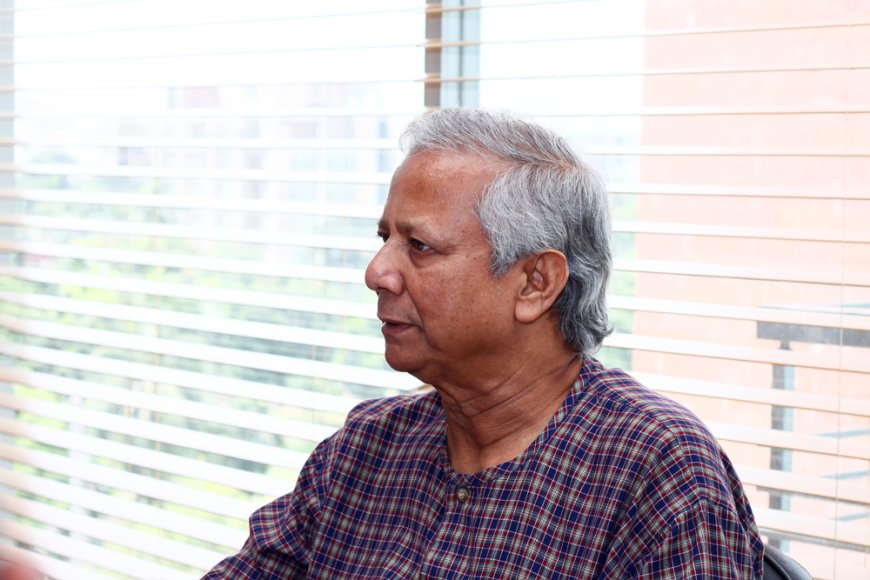We are not going anywhere
Is it for the Interim Government to arrogate to itself the sole power to determine the time-frame for elections?

"We are not going anywhere" is an ominous statement when taken by itself, but even more so when made by an unelected, unopposed member of government.
But the statement isn't to be taken by itself. It is set in a context -- "the responsibility entrusted to us is a significant one; we cannot abandon this duty" -- words that on the face of it validate the previous statement and conjure up the image of selfless warriors, duty bound to deliver up a righteous outcome. Reassuring, and taken as a whole, quite noble one might think.
The trouble is, even the second part of the statement is problematic. Entrusted by whom? Not by God surely, as some sort of Heavenly Mandate or by doctrine with Professor Yunus playing the part of the Great Reformer. Who then, has entrusted these particular individuals, mere mortals by all accounts, with the herculean task of "fixing" Bangladesh?
Well the people of Bangladesh, of course. But wait, there are many people in Bangladesh and it is in plain sight that not all of them, maybe not even a majority of them, continue to entrust them with this responsibility -- if ever the majority did, but we will never know because they were never asked.
What we do know is that there have been several calls from various quarters for the resignation of at least three advisers, and a growing call for a democratically elected government to replace the entire interim government. An interim government, let us remember, is a creature of necessity, a place holder, and one with limited jurisdiction and time.
But this interim government has and continues to act ultra vires both in jurisdiction and in duration, leading to a deepening discontent among the people, which has been voiced by leaders of one of the largest, if not currently the largest political party with massive popular support, and the joint chiefs of staff who are in fact constitutionally entrusted with a "significant responsibility" and one which they have a duty not to abandon.
Dr Yunus's reaction to these grumblings has been to contemplate resignation. Let's consider the validity of this.
While we cannot know for sure how many people endorse the rest of his cabinet, it is plausible that a large number of Bangladeshis originally endorsed his own appointment as Chief Advisor. Again, we dont know for sure because no one bothered to ask. But for arguments sake lets just say that they did, and that his choice of cabinet members was unquestioned to begin with, owing to his stature and qualifications.
The fact that it is now being questioned is something that requires discussion, but not in closed door meetings where the interim government effectively validates itself and then declares that it is not going anywhere. It has to be put to a test.
Professor Yunus may well still be the people's choice, in which case his resignation would not be the will of the nation. Therefore his resignation or his continued appointment is something that has to be put to the people, if for nothing else than to silence detractors, including the leaders of the BNP and the chiefs of staff. It cannot be done with vague notions of having been entrusted with an eternal duty or by a statement of defiance.
Governments are entrusted with a duty, sure, but that can also be withdrawn. Absent any other mechanism for official opposition or for a no-confidence vote, the people of Bangladesh have little choice but to take to the streets and voice their preference, as they are doing, but are being told that this doesn't count.
The Interim Government like any government we desire to have, must be removable if and when the people of Bangladesh believe it is time for it to go. This was the very crux of the July Uprising, a demand for public participation and for an end to unopposed government.
A last minute show, theatre at best, of popular support was attempted, by hosting meetings with political parties and statements like "with the people, necessary action will be taken" -- however these fall woefully short of an actual mechanism to gage the public sentiment.
What are the actions? Who are the people? Processes and timelines remain vague. The parties pressed their demands and requested cooperation in a manner which is more akin to an audience at a royal Darbar than any sort of democratic feedback loop. And in any case, an unqualified support for all advisers was not given by at least one of the parties.
And so a statement like "we are not going anywhere" under current circumstances is tone-deaf at best, bordering on autocratic, at worst.
Zeeshan Khan is the author of 'Right to Passage -- Travels Through India, Pakistan and Iran' and a barrister from Middle Temple
What's Your Reaction?




















































































